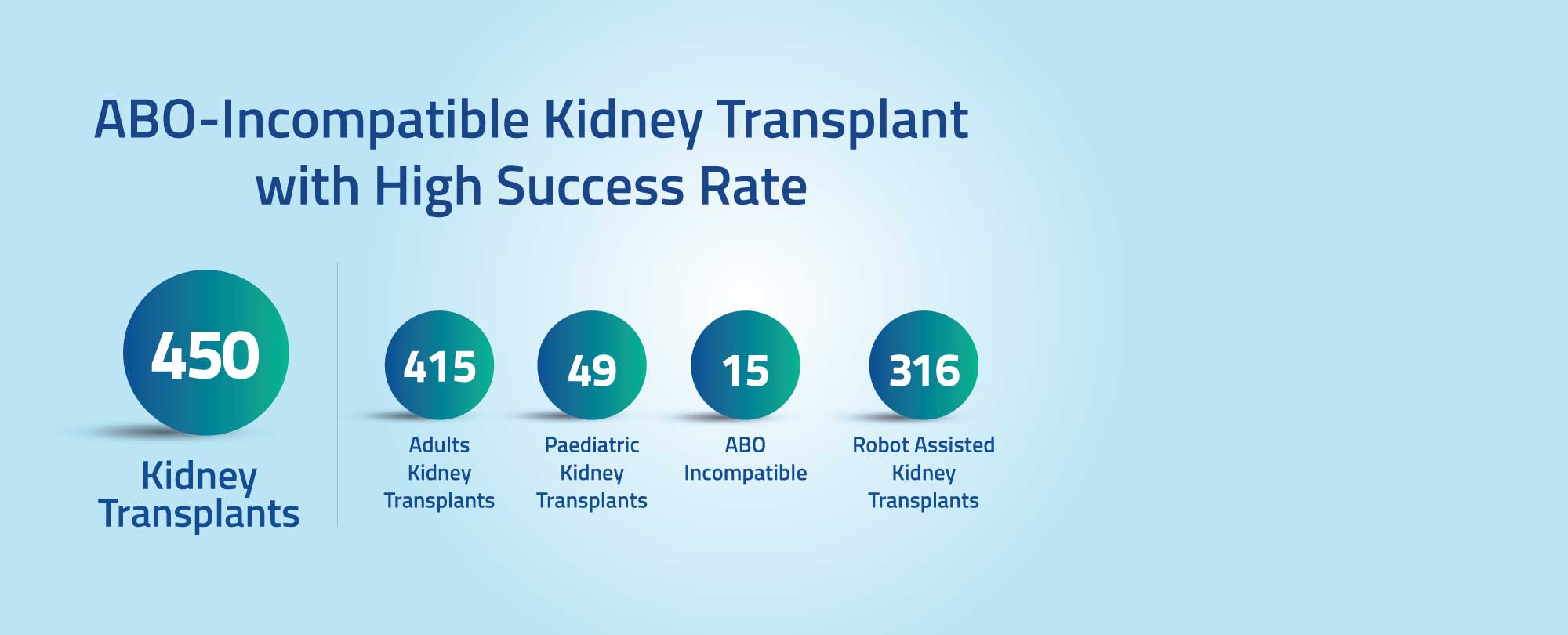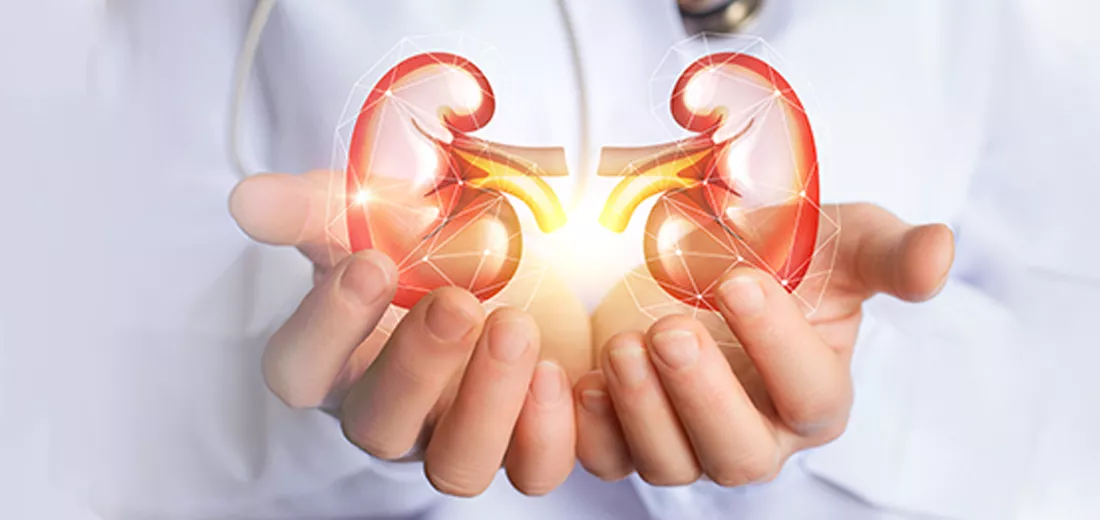Providing excellent clinical care to patients suffering from acute and chronic renal conditions, we are engineered to deliver excellent outcomes. As one of the most technologically advanced programs in India, we are dedicated to caring for patients with all types of kidney disorders and abnormalities.
These include clinical nephrology, hemodialysis, peritoneal dialysis, critical care nephrology, and renal transplantation.
Our centre specialises in the treatment of a broad spectrum of urological conditions, ranging from cancers of the urogenital and renal system to ailments such as male and female incontinence and even paediatric urology.
SYMPTOMS
The symptoms of kidney or renal damage include symptoms like swollen ankles, vomiting, weakness, poor sleep, and shortness of breath. If not addressed medically, the kidneys will eventually become dysfunctional – a life-threatening condition
ASTER MEDCITY - SOUTH INDIA NO 1 IN ROBOTIC-ASSISTED KIDNEY TRANSPLANT
- Best urology & nephrology hospital in Kerala. The first facility of its kind in Kerala to offer high-precision robotic kidney and urology surgery
- First in India to perform a robotic kidney tumor removal.
- The third center in the world to perform a robotic transvaginal renal transplant surgery
- The first facility in Kerala to offer robotic surgery using a high-precision da Vinci surgery system
- We have highly experienced nephrologists, urologists, renal transplant surgeons, anesthetists, critical care experts, and renal pathologists, and an award-winning team of nurses, renal dieticians, rehabilitation experts, and qualified technicians
ACHIEVEMENTS
- 330+ Renal Transplants done so far
- 35+ Pediatric Transplants done so far
- 200+ Robotic renal transplants so far
- 1Lak + Hemodialysis sessions done so far
- 4+ Kidney Transplantation in children below 10 kg weight
SERVICES
We provide comprehensive treatment for all types of diseases under one roof. Our highly experienced doctors supported by specially trained clinical staff, ensure the best care for you
Kidney Transplant Program
Transplant program is one of the options where a person post-transplant can return to total normal. You can have a wonderful quality of life with the help of the transplant program.
Peritoneal Dialysis
- The peritoneal dialysis unit offers comprehensive support, including pre-peritoneal dialysis counseling sessions and training programs for patients and their caregivers. The unit also has an automated peritoneal dialysis cycle for nocturnal dialysis
- For the management of patients with renal failure
- Intermittent Peritoneal Dialysis
- Continuous Peritoneal Dialysis & Continuous Cycle Peritoneal Dialysis
Haemodialysis
- The Haemodialysis unit here is a state-of-the-art facility with fully computerized dialysis machines and a water treatment plant. Manned 24/7 by expert dialysis technologies and nurses, patients are ensured personal attention and maximum privacy.
- For treatment of patients with kidney failure
- Conventional Haemodialysis
- Continuous Renal Replacement Therapy ( CRRT)
- Slow, low-efficiency Dialysis
- Haemofiltration
- Haemodiafiltration
- Haemoperfusion
- Plasmapheresis
Robot-assisted kidney transplantation (RAKT)
Traditionally, kidney transplantation is carried out through an incision in the lower abdomen; this requires a long incision (often above 15cm), especially in obese patients and children. Larger wounds are associated with more wound-related morbidity (more pain, longer convalescence period and postoperative recovery, and poor cosmesis). Open kidney transplantation through a small incision was tried but had significant challenges,, especially for vascular anastomosis; hence, it is not widely practiced.
The advantages of RAKT are less blood loss, less pain, shorter hospital stay, speedy recovery, fewer postoperative complications, lower incidence of wound-related complications, and better cosmesis (Figure 2) when compared to OKT.
FAQs
At Aster Hospitals we provide the highest quality of care and a transformative experience for all your healthcare needs. With our network of multi-speciality hospitals, specialised doctors, and world-class technology, we bring global standards of medical care to our patients.
What causes kidney failure?
Chronic kidney disease (CKD) occurs when your kidneys have been malfunctioning for more than 3 months. It’s an irreparable, life threatening condition and there might be no visible symptoms at all.
Diabetes (types 1 and 2), high blood pressure, immune system diseases such as Lupus and chronic viral illnesses like AIDS, Hepatitis B and Hepatitis C can also cause kidney failure.
The other reasons for kidney failure include:
- Multiple episodes of urinary tract infection
- Post-strep infection
- Polycystic kidney disease
- Inherited kidney diseases
- Congenital or birth defects - In many cases, the defect is rectified while the baby is still in mother’s womb; whereas those with major complications can only be managed at a later stage.
- Drugs and toxins, including long-term use medications like NSAIDs (Non Steroidal Anti Inflammatory Drugs
- Long-term exposure to certain chemicals
What are the types of kidney transplant?
There are two types of kidney transplants: Live donor Transplant and Cadaver Transplant
When a person is transplanted with a kidney from a live donor, it is called Live Donor Transplant. The donor could be anyone - a family member, friend, colleague or even a random person who is generous enough to gift life by donating one of his/ her kidney.
Usually, the success rates of kidney transplants in which the donor and recipient belong to one family (parent/ sibling) are higher. This is because of high donor-recipient compatibility, which means the chances of rejection are very low. A live donor makes things easy as the waiting period is lesser and the patient gets well faster.
Cadaver transplant is when the kidney is got from a donor who is certified brain-dead. He or she would have would have signed up for donation before death. The kidney is surgically removed after obtaining consent from the deceased’s family and transplanted in the recipient.
What are the possible post-transplant risks?
The post-surgical risks, like every other transplant surgery, include rejection, infection, bleeding or reaction to anaesthesia.
Rejection happens when the body fails to recognise the new kidney and fights to destroy it. During the first few weeks or months post-surgery, your body may try to reject your new kidney. This is called acute rejection and occurs in 25 - 55% of the recipients. You’ll be given immuno-suppressants to counter this problem. Remember, it is mandatory to continue these medicines for the rest of your life.
There is also a chance of chronic rejection - a gradual, progressive loss of kidney function that may occur over many years. Unfortunately, there’s no known treatment for chronic rejection and the patient may have depend on dialysis again or opt for another transplant.
Aster Centre of Excellence in Multi-Organ Transplant has a very strong infection control system that’s managed by a highly-trained team of infectious diseases & infection control Physicians. Besides, we also have advanced technology like the HEPA Filter that purifies air to 0.3 microns, creating a safe and sterile environment for the patient.
Is follow-up required post kidney transplant?
It is very important to visit your consulting doctor regularly and undergo all prescribed follow-ups and tests to make sure that your new kidney is functioning well. Remember, transplant surgery is a second chance at life and you need to be responsible for your own well-being.
What is Kidney Transplant?
Kidney transplant is the process of replacing the diseased kidney with a healthy, donated kidney. It is recommended only if the kidneys are so damaged that they cannot be managed medically (Chronic Kidney Disease or End Stage Renal Disease).
In some cases, transplant might not be a practical solution if the patient has an active infection or another life-threatening disease such as cancer, severe heart or lung diseases.
Fortunately, according to worldwide figures, the success rate of kidney transplant is above 95%. This not only comes as a reassurance for those opting for transplant, but also reaffirms the fact that kidney transplant is indeed an effective mode of treatment.
What are the pre-transplant formalities?
You will have to go through a series of investigations before the surgery to ensure that the donor kidney matches your tissue and blood type. You will also be screened for other health problems including heart or lung diseases.
After these tests, you will be enlisted on the transplant list and also on the organ sharing network list. As soon as a matching recipient is available, we will let you know; and if all factors are favourable, our entire team will work as one to ensure you undergo the surgery without any issues.
What will it be like after the surgery?
You’ll be under continuous medical observation for 7 to 10 days post surgery, so that we can check whether your new kidney is functioning properly. At times, the new kidney might take some time to start functioning and produce urine. You might have to undergo dialysis till then and also take medications like diuretics to help the kidney expel excess water and salt from your body.
Our nurses and rehabilitation experts will take good care of you and guide you through your recovery.
We have state-of-the-art hemodialysis and peritoneal dialysis facility, complete with a water treatment plant to ensure high-quality dialysis for patients.
Advanced Technology & Facilities
- DA VINCY SURGERY ROBOT - The da Vinci system at Aster MARS is a state-of-the-art surgery robot with three deft mechanical hands and a 3D video camera that works like a third eye for the surgeon. These are inserted into the body through very small incisions, and the surgeon, who is seated at the console that provides a highly magnified 3D view of the area, performs the surgery using robotic hands.
- 3.0 TESLA WIDE BORE MRI
- 256 Slice philips ICT scanner
- QR1 KARLSTROZ FUSION INTEGRATED TRANSPLANTS SUITS WITH AUTOPILOT ANESTHESIA
- Independent ICUs With Intellispace Critical Care Anesthesia
- Pediatric Kidney Transplant
- Combined dual organ Transplant
- Live (related) Kidney Transplant
- Deceased Donor Kidney Transplant
- DA VINCY SURGERY ROBOT - The da Vinci system at Aster MARS is a state-of-the-art surgery robot with three deft mechanical hands and a 3D video camera that works like a third eye for the surgeon. These are inserted into the body through very small incisions, and the surgeon, who is seated at the console that provides a highly magnified 3D view of the area, performs the surgery using robotic hands.
- 3.0 TESLA WIDE BORE MRI
- 256 Slice philips ICT scanner
- QR1 KARLSTROZ FUSION INTEGRATED TRANSPLANTS SUITS WITH AUTOPILOT ANESTHESIA
- Independent ICUs With Intellispace Critical Care Anesthesia
- Pediatric Kidney Transplant
- Combined dual organ Transplant
- Live (related) Kidney Transplant
- Deceased Donor Kidney Transplant
- DA VINCY SURGERY ROBOT - The da Vinci system at Aster MARS is a state-of-the-art surgery robot with three deft mechanical hands and a 3D video camera that works like a third eye for the surgeon. These are inserted into the body through very small incisions, and the surgeon, who is seated at the console that provides a highly magnified 3D view of the area, performs the surgery using robotic hands.
- 3.0 TESLA WIDE BORE MRI
- 256 Slice philips ICT scanner
- QR1 KARLSTROZ FUSION INTEGRATED TRANSPLANTS SUITS WITH AUTOPILOT ANESTHESIA
- Independent ICUs With Intellispace Critical Care Anesthesia
- Pediatric Kidney Transplant
- Combined dual organ Transplant
- Live (related) Kidney Transplant
- Deceased Donor Kidney Transplant
- DA VINCY SURGERY ROBOT - The da Vinci system at Aster MARS is a state-of-the-art surgery robot with three deft mechanical hands and a 3D video camera that works like a third eye for the surgeon. These are inserted into the body through very small incisions, and the surgeon, who is seated at the console that provides a highly magnified 3D view of the area, performs the surgery using robotic hands.
- 3.0 TESLA WIDE BORE MRI
- 256 Slice philips ICT scanner
- QR1 KARLSTROZ FUSION INTEGRATED TRANSPLANTS SUITS WITH AUTOPILOT ANESTHESIA
- Independent ICUs With Intellispace Critical Care Anesthesia
- Pediatric Kidney Transplant
- Combined dual organ Transplant
- Live (related) Kidney Transplant
- Deceased Donor Kidney Transplant
Blogs
The source of trustworthy health and medical information. Through this section, we provide research-based health information, and all that is happening in Aster Hospital.




